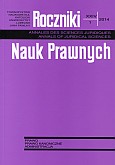Wpis faktu zawarcia małżeństwa kanonicznego do rejestru małżeństw akt stanu cywilnego
Recording canonical marriage in the civil register
Author(s): Anna Monika BaranowskaSubject(s): Law, Constitution, Jurisprudence
Published by: Towarzystwo Naukowe KUL & Katolicki Uniwersytet Lubelski Jana Pawła II
Keywords: concordat marriage; concordat; civil effects; entry in the register of marriages; vital records
Summary/Abstract: Marriage, being a union of man and woman, is one of the oldest forms of establishing human relationships. Since spouses are also citizens of a state and members of religious communities, the two dimensions are not mutually contradictory, and now couples enjoy the possibility of contracting concordat marriage. This form of marriage demonstrates the Church’s recognition of dualism inherent in the system of marriage law, and its attempts to enable people to enter into marriage either in the ecclesiastical forum or before a state official in a single act. In practice, such marriage is concluded in the canonical form while producing civil law effects, as provided by the state law. The parties to marriage, the clergyman, and the registrar are all obliged to perform a number of formalities. The final step of this quasi-administrative procedure is an entry of a lawfully concluded marriage in the register of marriages filed in the vital records. Henceforth, the marriage thus concluded has both civil and canon law effects. Individual states, being signatories to concordat agreements with the Holy See, are free to further specify their domestic concordat regulations and enumerate the requisite actions for canonical marriage to produce effects under civil law. States do this differently but the general principle remains the same.
Journal: Roczniki Nauk Prawnych
- Issue Year: 24/2014
- Issue No: 1
- Page Range: 123-141
- Page Count: 19
- Language: Polish

